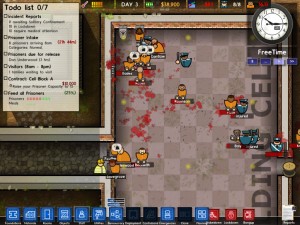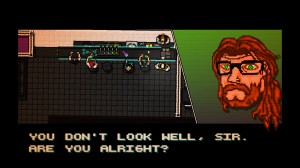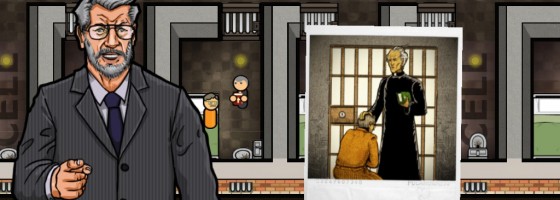Video game storytelling and graphics have gotten progressively more powerful over the years. And as games became more graphic, in more ways than one, we’ve seen people speak out about games that they are not comfortable with.
Whether being topical like Six Days in Fallujah, ultra violent like Hotline Miami or exploring a touchy subject like Prison Architect. Some games are immediately discounted while keeping their negative stigma for the duration of their release. Now, video games are an often debated subject and it always feels like these topics are not as black and white when people start demanding boycotts and games not to be made.
Art vs. Business:
In an earlier post talking about historical accuracy in video games, I brought up the debate about whether video games are the correct medium for controversial topics.
This goes back to the conversation if video games are more on the side of being “art” or if they are products, nothing more. People look down on products aimed at sparking controversy for controversy sake. Where a touchy subject is glorified or shown in such a matter that the original message or theme is buried underneath the shocking subject matter.
The video game industry like other entertainment industries has been attacked numerous times in the past on the issue of violence and being aimed at children. And recently we have seen a rise in debates on sexism both within game design and the industry itself.
It is definitely a sign of maturing within the industry that people are having these conversations, but putting aside the issue of sexism in the industry for now, there is the issue of free speech. Namely, should designers have carte blanche when developing games?

Introversion’s upcoming game combines the simulator aspects of old school Bullfrog games, with the concept of running a prison and all that entails
The trouble with talking about this is that video games are still considered a young industry and many people still think that video games are only for children.
However, the trials that the game industry is starting to go through in terms of content, is something that TV has dealt with for over half a century.
Freedom is Just Another Word…
Free speech has always been a touchy and hotly debated topic not just within the game industry. Throughout the last century with the rise of TV as an entertainment medium, there were debates about what could and could not be allowed on TV.
At one point it was perfectly alright to advertise cigarettes on kid’s shows both during commercials and as a plug at the end. But you could not show violence or certain minorities. And of course any kind of sexual material was not allowed.
For people wanting to tell mature stories or ones that made people think, they were shut down by executives and advertisers who didn’t want to lose their audience. During the 50s and 60s, Rod Serling fought tooth and nail against advertisers and network execs and created the Twilight Zone as a safe haven for writers who wanted to tell stories about the human condition and society under the guise of a science fiction show.
The thing that we’ve seen time and time again is that content that stands the test of time is never about mass appeal. It will usually shock some people or outright offend the cultural sensibilities of the era. And while it is fine for people to not like something, that doesn’t give them the right to demand the destruction or removal of it.
There was a story that Rod Serling told in an interview in the 50s. of how when he watched an episode of Lassie where she gave birth and loved it. But the network received complaints about showing that scene and had to remove it.
One of my favorite shows: Breaking Bad is a very disturbing show and I doubt would ever be allowed on TV 30 or even 20 years ago. Yet at the same time, it has won numerous awards for its writing and actors despite the fact that there is nothing “mass appealing” about it.
Bringing this back to the game industry, it is perfectly fine for people to denounce and argue against the depiction of women in a game like Dead or Alive, the subject matter of Prison Architect or Hotline Miami 2′s debated rape scene. I or no one else has the right or authority to tell you how you should feel.

Hotline Miami without the recent controversy regarding its rape scene would still be banned from any traditional retail market on its violence and subject matter alone
But in the same breath, you don’t have the right to demand that content that offends you to be removed. Simply put, free speech is a two way street.
And I’d rather live in a world where games like Hotline Miami 2, DOA and Prison Architect are allowed to exist as defined by the respective designers, compared to a world where they would be stifled or outright banned from being released.
And yes, there will always be games made to use shock value for quick sales but you can’t denounce the whole on the count of a few bad apples. As with any medium, if you want to see it grow and achieve new heights then you have to be willing to let people push the boundaries.
Will every project be a cultural success that raises awareness for the subject matter in an intelligent light? Of course not. But the only way we’ll be able to see the ones that do, is to not set up roadblocks that immediately stop any conversation from happening.
Just as every video game should not be designed with the same mentality of hits like Call of Duty or World of Warcraft, not every video game is/should be, aimed at appealing to everyone as often, the most creative works aren’t meant to be featured in a store like Best Buy or Wal-Mart.
Before digital distribution took hold, we had a similar situation for video games that we did with TV. Retailers held all the cards for a game to be sold there and developers and publishers had to adhere to their demands to get them on store shelves.
Thanks to digital retailers, designers are free to create whatever they want and while all of it may not be family friendly or multimillion dollar best sellers, I wouldn’t want to go back to the alternative.


